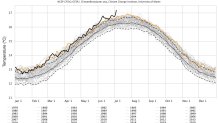The planetary average temperature hit 63 degrees Fahrenheit (17.23 degrees Celsius) Thursday, surpassing the 62.9-degree mark (17.18-degree mark) set Tuesday and equaled Wednesday, according to data from the University of Maine’s Climate Reanalyzer, a tool that uses satellite data and computer simulations to measure the world’s condition.
The average global air temperature is recorded two meters above the Earth's surface at various locations with the data compiled by the National Oceanic and Atmospheric Administration (NOAA) and the University of Maine.
That average includes places that are sweltering under dangerous heat — like Jingxing, China, which checked in almost 110 degrees Fahrenheit (43.3 degrees Celsius) — and the merely unusually warm, like Antarctica, where temperatures across much of the continent were as much as 8 degrees Fahrenheit (4.5 degrees Celsius) above normal this week.
Prior to this week, the previous record for the Earth's hottest day was set in July 2022 and in August 2016 when the global temperature reached 62.46 degrees.
Get DFW local news, weather forecasts and entertainment stories to your inbox. Sign up for NBC DFW newsletters.
The rise in global temperatures is likely due to recent heat waves in the US, Canada and Europe and El Nino. During El Nino conditions sea surface temperatures rise above average in the Pacific Ocean.
NOAA/ Maine global temperature data goes back to 1979, but researchers say these temperature readings are comparable with data that goes back much further. They are confident this is the highest global temperature since instrumental measurements began around the 1850s.

NOAA on Thursday issued a note of caution about the Maine tool's findings, saying it could not confirm data that results in part from computer modeling.
“Although NOAA cannot validate the methodology or conclusion of the University of Maine analysis, we recognize that we are in a warm period due to climate change,” NOAA said.
Still, the Maine data has been widely regarded as another troubling sign of climate change around the globe. Some climate scientists said this week they weren't surprised to see the unofficial records.




